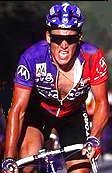
ABOUT US
get an e-mail update!
Riding the Rockies by Damon Phinney
The
Lance Armstrong Foundation
Upfront
Armstrong's Glorious Win for Young and Old
by
Staff
Lance Armstrong Won the Tour de France for the USA and for cancer survivors everywhere.
"This feeling is incredible.. With my problems, my history, it is incredible. It's a huge achievement after all I've been through and tremendously important for me and the team." Lance Armstrong was diagnosed with testicular cancer in 1996. He was told he had a 50% chance of surviving, since the disease had spread to his brain.
Sept. 9 1999. Lance Armstrong, who dedicated the US Postal Service Prostate Cancer Awareness stamp in May, won the Tour de France for the USPS team and for cancer survivors everywhere. Armstrong's incredible feat recalls the unvanquishable example of Terry Fox. By putting a spotlight on male genitourinary cancer, Armstrong may kickstart a new era in prostate cancer awareness and activism
It is time for men, men young and old, to speak out on their own behalf about cancers that target them. If anyone thinks age at disease onset is an excuse for apathy and neglect, think again.
This month Oncology Times, an independent newspaper for cancer specialists, carries a detailed report by Leslie Burgess on treating cancer in the elderly. Burgess reports on a session at the last annual meeting of ASCO (American Society of Clinical Oncology) on management of cancer in older patients. We hear constantly that prostate cancer is mostly a disease of older men -- as though this were an excuse for abysmal treatment options and lack of appropriate levels of research funding. This conference session in Atlanta ought to have focused on prostate cancer as one test case. Dream on! A lot of discussion of breast cancer, but apparently no special mention of prostate cancer at all.
Prostate cancer is the leading cancer killer of older men. It causes hardship, suffering, pain, and death to older men. Many activists are striving to make people aware of how deadly this disease can be to younger men if they develop it and are unable to get timely diagnosis and adequate treatment. We are making special efforts to reach African American men, who are at greatly increased risk. At the same time, as we say thank you to Lance Armstrong, let us speak out more vigorously about prostate cancer as a "disease of older men." Let us raise the roof calling for prevention for older men, improved treatments for older men, and a cure.

